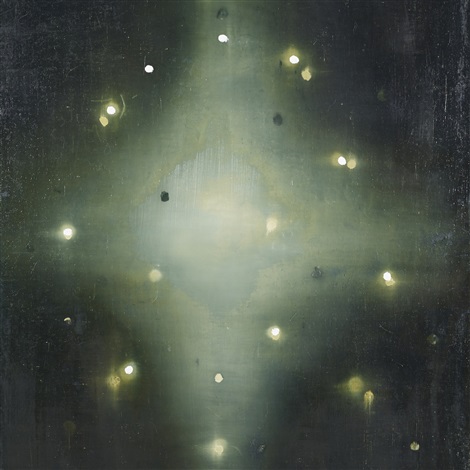He saw the lightning in the east and longed for the east,
but if it had flashed in the west he would have longed for the west.
My desire is for the lightning and its gleam, not for the places and the earth.
The east wind related to me from them a tradition handed down successively,
from distracted thoughts,
from my passion,
from anguish,
from my tribulation,
From rapture,
from my reason,
from yearning,
from ardour,
from tears,
from my eyelid,
from fire,
from my heart,
That "He whom you love is between your ribs; the breaths toss him from side to side."
I said to the east wind, "Bring a message to him and say that he is the enkindler of the fire within my hear
If it shall be quenched, then everlasting union, and if it shall burn, then no blame to the lover!"
Poem 14 of the Tarjuman al-Ashwaq, translated by R.A. Nicholson.
The doctrine of Wahdat al-Wujud by Ibn Arabi asserts that everything that exists can only exist because it is an aspect of Divine Reality, hence an aspect of Divine Unity itself. However, Sufi's assert that although Wahdat al-Wujud may be interpreted that Sufism see the face of God everywhere, it does not mean that it has reduced God to everything.
God remains supremely transcendent, even though everything which arises and exists resembles him (tashbih). He resembles nothing but himself (tanzih).
From the philosophical point of view God is pure; from the mystical and devotional point of view, He is Absolute Beauty, of which earthly beauty, whether it be of form, or thought, or action, is but a dim reflection. Our finite minds cannot comprehend the Infinite: we can only speak in metaphors.
Overwhelmed by His Beauty, Ibn Arabi conceives of Him, above all things, as the eternally Beautiful. His poetry borrows the impassioned language of the lover. He is all Beautiful, and the whole universe is the mirror of His Beauty. It is said that seventy thousand veils separate the Absolute Being, or Beauty, from the world of matter and sense.
but if it had flashed in the west he would have longed for the west.
My desire is for the lightning and its gleam, not for the places and the earth.
The east wind related to me from them a tradition handed down successively,
from distracted thoughts,
from my passion,
from anguish,
from my tribulation,
From rapture,
from my reason,
from yearning,
from ardour,
from tears,
from my eyelid,
from fire,
from my heart,
That "He whom you love is between your ribs; the breaths toss him from side to side."
I said to the east wind, "Bring a message to him and say that he is the enkindler of the fire within my hear
If it shall be quenched, then everlasting union, and if it shall burn, then no blame to the lover!"
Poem 14 of the Tarjuman al-Ashwaq, translated by R.A. Nicholson.
The doctrine of Wahdat al-Wujud by Ibn Arabi asserts that everything that exists can only exist because it is an aspect of Divine Reality, hence an aspect of Divine Unity itself. However, Sufi's assert that although Wahdat al-Wujud may be interpreted that Sufism see the face of God everywhere, it does not mean that it has reduced God to everything.
God remains supremely transcendent, even though everything which arises and exists resembles him (tashbih). He resembles nothing but himself (tanzih).
From the philosophical point of view God is pure; from the mystical and devotional point of view, He is Absolute Beauty, of which earthly beauty, whether it be of form, or thought, or action, is but a dim reflection. Our finite minds cannot comprehend the Infinite: we can only speak in metaphors.
Overwhelmed by His Beauty, Ibn Arabi conceives of Him, above all things, as the eternally Beautiful. His poetry borrows the impassioned language of the lover. He is all Beautiful, and the whole universe is the mirror of His Beauty. It is said that seventy thousand veils separate the Absolute Being, or Beauty, from the world of matter and sense.

No comments:
Post a Comment